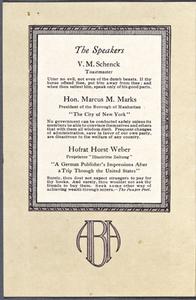
1906: "The sixth annual dinner of the American Booksellers Association, held at the Aldine Clubs's rooms, 111 Fifth Avenue, last night, was a notable gathering of those who toil in the making, producing, and vending of books."
1907: "For the first time in more than twenty years there is an increase in the number of booksellers. The increase is not local to any section of the country. This condition may be credited chiefly to the efforts of two book trade organizations--the American Booksellers Association and the American Publishers Association--to maintain equable retail prices."
1908: "At their eighth annual convention, held this week at the Victoria Hotel, there were enough delegates--some seventy or more--from different parts of the country to give to this meeting of the American Booksellers Association something of a representative character."
While demand for books was on a par with prior years, there had been decreasing profits, chiefly because fiction published "at a nominal price of $1.50 or more was sold by the department stores and others, to whom the sale of books was merely a side issue, at prices on which there was scarcely any profit. The remedy for this appeared to the members to be along the lines suggested by the Publishers' Association last year--the publication of books at net prices from which no departure would be allowed among individual dealers."
1909: "About 400 members of the American Booksellers Association attended their annual dinner in the Hotel Astor last night, and afterward heard speeches.... The souvenirs were books by each of the writers that spoke, and a little bottle of sherry labeled 'Tono Bungay,' after H.G. Wells's book of that name."
1910: "Prof. Harry A. Franck of the Technical High School of Springfield, Mass., told the members of the American Booksellers Association at their dinner in the Hotel Astor last night how he journeyed as a vagabond around the world a few years ago, starting without a cent in his pocket and encircling the globe without begging."
1911: In a discussion titled "How to Increase the Volume of Your Book Business," F.L. Reed of Grosset & Dunlap Company said, "I would suggest a series of educational advertisements to be run in the daily papers, telling the people how much enjoyment there is to be found in the society of books, what books mean to the home, and how many phases of life which touch upon the experience of each individual are depicted in books."
1912: Speeches and education sessions included "Juvenile Readers as an Asset"; "Bookseller and Public"; "Fewer Books and Better"; and "The Publishers' Advertising Man."
1913: In a presentation titled "More Steps Forward," William Arnold of the Syndicate Trading Co. and the H.B. Claflin Co. "put forward a suggestion that must have seemed revolutionary in the trade, and spirited discussion ensued. The suggestion was that booksellers should have the privilege of returning to the publisher or jobber any copies of a book on hand after one year, receiving a credit check for 90% of the purchase price."
 |
|
| Program from the 1914 American Booksellers Association banquet (via) | |
1914: "Eighty-seven percent of the reading public is unable to get the new books as published, despite its desire for them, according to a report made to the American Booksellers Association yesterday at the Hotel Astor by Richard B.G. Gardner of the Publishers Co-operative Bureau; and despite the recent added facilities of cheap transportation through the parcel post, a mere 17% of the booksellers' market is being served.... The formation of a single organization including all the booksellers of the country to prevent price-cutting without conflicting with the trust laws was strongly urged."
1915: Fred Melcher, who sells books in Indianapolis, "told at some length how the booksellers out there had got the idea of making the bookshops a sort of public institution." Melcher said: "The booksellers in Indianapolis have the highest ideals, and they get their clerks together and discuss literature and the business end of it and the plots of books. The bookstore, more than any other line of business, can become a part of the community spirit."
1916: For its first convention outside New York, the ABA met in Chicago. The session, "Some Mistakes of Booksellers," was presented by David Koeller, Jr., who advocated modern business methods: "Efficiency counts in every business but the book business. We are not credited with having much sense or ability; if we had, I guess we would be making money instead of working for glory and the little crumbs the big fish overlook."
1917: In a piece headlined "War Lifts Literary Taste," the Times reported that "because the war has created a demand for more serious literature," booksellers were urged by ABA president Ward Macauley "to stimulate the sale of books that offer authoritative information upon the issues involved in the struggle. Mr. Macauley pointed out that what was needed most was selective literature. The public, he said, was no longer in the mood to be merely amused and entertained, but wanted knowledge."
And now, we return you to your regularly scheduled 21st century BookExpo, soon to be in progress.

